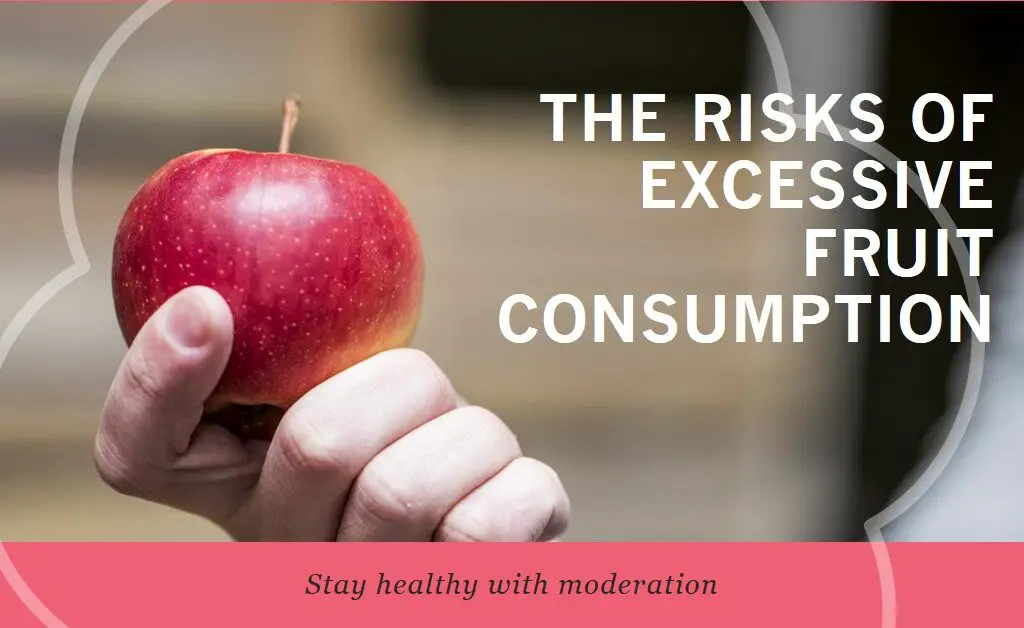Key Takeaways
- Eating fruit is part of a healthy diet, but excessive fruit consumption can cause side effects like digestive issues, weight gain, high blood sugar, and heart problems for some people.
- The recommended daily intake is around 2-3 cups of fruit per day or 4-5 servings. Consuming more than this amount, especially in the form of fruit juice or dried fruit, may cause health issues over time.
- Fruit contains natural sugar, but also provides beneficial nutrients like vitamins, minerals, antioxidants, and fiber. The fiber content helps mitigate blood sugar spikes when eating whole fruits.
- People with diabetes, insulin resistance, or other metabolic conditions may need to monitor their fruit intake more closely to prevent complications.

What are the Health Risks of Eating Too Much Fruit?
Fruit is nutritious and part of a balanced diet, but overdoing fruit consumption can negatively impact your health. Here are some of the main risks:
Digestive Problems
Eating a lot of fruit can lead to digestive issues like:
- Stomach pain
- Bloating
- Diarrhea
- Acid reflux
These side effects usually occur because the high fiber content in fruits can be difficult to digest in large amounts. The fructose sugar can also cause irritation.
Weight Gain
Although fruits are lower in calories than many other foods, getting a lot of your daily calories from high-sugar fruits can lead to weight gain over time. This risk increases if you drink fruit juice or eat dried fruits, which have more concentrated sugar without the fiber.
Several studies have linked high fruit juice intake to obesity in both adults and children .
Elevated Blood Sugar
The natural sugars in fruit can cause unhealthy blood sugar spikes if you eat too much at one time, especially from fruit juice. High blood sugar can contribute to insulin resistance, metabolic syndrome, and type 2 diabetes .
People with diabetes need to be careful with fruit and monitor their carbohydrate intake.
Heart Disease Risk
Excessive fruit intake may raise triglycerides, a type of fat in your blood that increases heart disease risk at high levels. High sugar intake from fruit can also lead to weight gain, another risk factor.
However, moderate fruit intake lowers heart disease risk by providing antioxidants, vitamins, minerals, and fiber.
How Much Fruit Is Too Much?
Most experts recommend limiting fruit intake to 2-3 cups per day for adults. This equals around 4-5 servings when following a 2,000 calorie diet.
The table below shows standard serving sizes for common fruits:
| Fruit | Serving Size |
|---|---|
| Apple, banana, orange | 1 medium piece |
| Grapes | 1 cup |
| Strawberries | 1 1⁄4 cup whole berries |
| Blueberries | 3⁄4 cup |
| Fruit juice | 1⁄2 cup |
Consuming more than 3 cups of fruit daily, especially in the form of juice, can cause health issues for most people.
However, athletes, active individuals, and growing teenagers may be able to tolerate slightly higher intakes without negative effects.

Problems with Fruit Juice and Dried Fruit
Fruit juice and dried fruit have increased potential for negative health impacts.
Fruit Juice Drawbacks
- Loses beneficial fiber content during processing
- Easy to consume excess sugar and calories
- Can contribute to weight gain and diabetes risk
- Often has added sugars besides natural fruit sugar
Dried Fruit Drawbacks
- Concentrates natural sugar content
- High calorie density promotes overeating
- Easy to exceed recommended fruit intake
Experts recommend limiting fruit juice intake to 1 cup (8 ounces) per day and keeping dried fruit portions small .
Health Benefits of Fruit
Despite potential drawbacks with overconsumption, fruits provide essential vitamins, minerals, fiber, and antioxidants when eaten in moderation as part of a healthy diet.
Key Nutrients
- Vitamin C – Boosts immunity and skin health
- Potassium – Reduces blood pressure and stroke risk
- Folate – Important for cell growth and division
- Antioxidants – Protects cells from damage
Fiber
Fruit fiber helps:
- Aid digestion
- Control blood sugar
- Lower cholesterol
- Promote feeling full after eating
Disease Prevention
Eating fruit helps prevent:
- Heart disease
- High blood pressure
- Certain cancers
- Diabetes
- Obesity
Who Needs to Limit Fruit Intake?
People with the following conditions need to be cautious with fruit consumption:
- Diabetes
- Pre-diabetes or insulin resistance
- Fructose intolerance
- Irritable bowel disease (IBD)
These individuals should monitor portion sizes and prefer low-sugar fruits like berries. Consulting with a doctor or registered dietitian can help determine appropriate intake.
Healthy Ways to Eat Fruit
Follow these tips to get the benefits of fruit without overdoing it:
- Focus on whole fruits – Avoid juice and limit dried varieties
- Mix high and low sugar options – Balance grapes and bananas with berries
- Pair with protein or fat – Eat fruit with nuts, cheese, or yogurt
- Watch portion sizes – Measure servings instead of eating freely
- Include veggies too – Aim for variety in produce choices
Conclusion
Fruit is part of a nutritious diet, but gorging on large quantities can negatively impact your health. Experts recommend 2-3 cups per day as adequate intake for most healthy adults. Pay attention to serving sizes, choose whole fruits over juice, and pair produce with other healthy foods. Those with medical conditions like diabetes should monitor and limit fruit consumption to prevent complications. Combined with vegetables and other smart dietary choices, fruits can provide valuable nutrients without the risks from overindulging.
FAQs
Can eating too much fruit give you diabetes?
Yes, eating excessive amounts of fruit, especially fruit juices and dried fruits which have high sugar content, can contribute to insulin resistance over time which can lead to type 2 diabetes in some people. The natural sugars like fructose in too much fruit can cause unhealthy blood sugar spikes. People with diabetes or pre-diabetes need to be careful with fruit intake and monitor their carbohydrates
How much fruit is safe per day?
Most experts recommend limiting fruit intake to around 2-3 cups of fruit per day or 4-5 servings following a 2,000 calorie diet. This equals about 1 medium sized piece of fruit or 1 cup of grapes or berries. Consuming more than this amount consistently, especially in the form of fruit juice or dried fruit, may cause digestive issues, weight gain, and blood sugar problems for some people over time.
What happens if you eat enough fruit?
Eating adequate fruit as part of a balanced diet provides beneficial nutrients like vitamins, minerals, fiber, antioxidants that can help lower disease risk and promote health. Moderate fruit intake as part of an overall healthy diet can aid digestion, control blood sugar, lower cholesterol, and help prevent heart disease, high blood pressure, certain cancers, diabetes among other benefits.
What happens if you eat too much fruit?
Potential health consequences of eating excessive amounts of fruit include digestive issues like stomach pain, bloating, diarrhea due to high fiber and fructose content. Excessive fruit intake can also contribute to unhealthy weight gain in some people due to calories and sugar, spike blood sugar levels, and negatively impact heart disease risk by raising triglycerides. People with specific medical conditions like diabetes, insulin resistance or fructose intolerance face higher risks of complications from overdoing fruit intake.